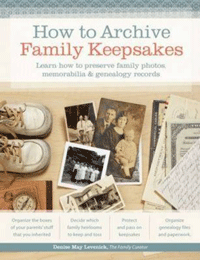 Archiving valuables and keepsakes is a perpetual problem for the family historian. This may be even more true for the family member who is not a “genealogists” or “family historian” but finds themselves the keeper of the family’s history and heirlooms. Important questions arise, such as the following:
Archiving valuables and keepsakes is a perpetual problem for the family historian. This may be even more true for the family member who is not a “genealogists” or “family historian” but finds themselves the keeper of the family’s history and heirlooms. Important questions arise, such as the following:
- What should I actually archive?
- Should I archive actual document and photographs, turn paper into a digital collections, or both?
- What is the best process for each?
- What else can I do with all this stuff?
- How do I organize documents, keepsakes, computer files, and heirlooms?
- How do I care for heirlooms, such as jewelry, dolls, medals and ribbons, and more?
All of these difficult questions, and more, are addresses in Denise May Levenick’s new book, How to Archive Family Keepsakes: Learn how to preserve family photos, memorabilia, & genealogy records. This new books seems to just about cover it all, while remaining relatively short, concise, yet, informative.
The book is comprised of 16 chapters organized into three sections. The first section helps you organize, prepare, and properly archive all your family’s treasures. Here you will learn to evaluate the value of what you have on hand and determine not only how to preserve these items, but to give consideration to long term storage or even donating items of historical significance.
The second section will help you evaluate and digitize your paper collections, and to manage your computer files. This does not mean you should plan on throwing away mountains of paper. You may be able to toss your own print out, but original documents and photos still have value. Digitizing simply provides a back up to these originals, as well as a means of sharing.
The final section is for the working genealogist or avid family historian. Here the author helps you learn to organize and improve your own files. Looking at area like improved citation, saving time and money, and organizing your software, you can learn to prepare you contributions to the family’s history, so when you pass it on it is ready for the next generation to move forward and not rework it all.
In addition to all the above mentioned information this book contains, I simply like its overall design and layout. The design is clean and simple, but still carries its share of charts, forms, and stand out information boxes to keep the book interesting and easy to follow.
Contents
Introduction
Part 1: I Inherited Grandma’s Stuff, Now What?
Chapter 1 Organize Your Objectives
Checkpoint 1: Organize Your Objectives
Chapter 2 Organize Your Plan
Checkpoint 2: Set Your Goals and Timeline
Checkpoint 3: Inventory Your Archive
Checkpoint 4: Order Your Storage Supplies
Chapter 3 Organize Your Assistance From Family Members
Checkpoint 5: Enlist Assistance
Chapter 4 Organize Your Archive
Checkpoint 6: Sort and Organize Your Archive
Checkpoint 7: Catalog Your Archive
Checkpoint 8: Find a Home for Your Archive
Chapter 5 Organize for the Future
Checkpoint 9: Donate Your Family Archive
Checkpoint 10: Plan Your Legacy
Chapter 6 Organize Archival Papers
Chapter 7 Organize Archival Photos
Chapter 8 Organize Artifacts
Part 2: Break the Paper Habit
Chapter 9 Organize and Digitize Your Paper Documents
It’s not practical to eliminate all paper files, but going digital saves storage space and search time. This chapter shows you how to move toward a paperless genealogy office step by step, from scanning to storage.
Chapter 10 Digitize Your Family Archive
Digital copies preserve heirloom originals and give you a working copy for research and creative projects. This chapter presents sample workflows to help you safely create digital copies of archive materials.
Chapter 11 Organize Your Paper Files
Do you feel buried in a mountain of genealogy papers? This chapter offers practical ideas for a personalized filing system to suit your research style and experience.
Chapter 12 Organize Your Computer
Your computer can be a top-notch filing clerk and research assistant with strategies in this chapter for a consistent file-naming system, simple folder structure, and scheduled backup plan.
Part 3: Root Your Research in Strategies for Success
Chapter 13 Organize Your Research
Productive research begins with organized research methods. This chapter outlines effective research strategies with step-by-step ideas, case study examples, and helpful resource checklists.
Chapter 14 Organize Your Source Citations
Without proof, there is no truth. This chapter offers an overview of effective citation styles and helpful checklists for citing your archival materials.
Chapter 15 Organize Your Software Solutions
Technology can advance your genealogy research by saving time and effort. This chapter will help you discover useful services to fit your needs, both web-based and on your computer.
Chapter 16 Organize and Discover Research Connections Online
Social media services, blogs, forums, and List-SERVs can help you find family and break down brick walls. Use the tips in this chapter to expand your genealogy reach.
Conclusion
Index
Copies of How to Archive Family Keepsakes: Learn How to Preserve Family Photos, Memorabilia and Genealogy Records are available from Family Roots Publishing; Price: $24.49.